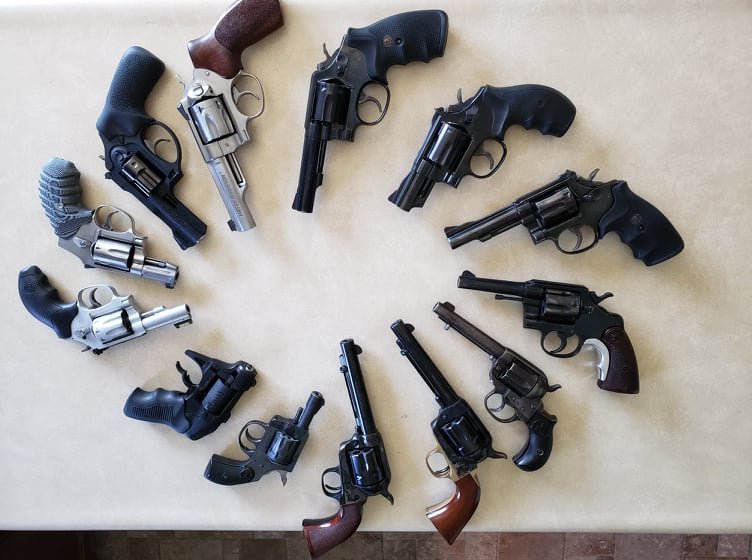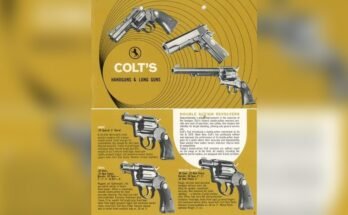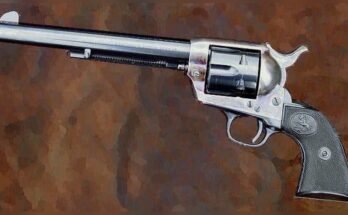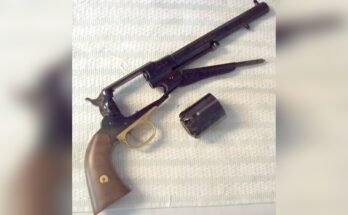Are you wondering if revolvers are truly reliable when it matters most? Whether you’re new to firearms or have experience, understanding how a revolver performs can give you confidence in your choice.
You deserve a weapon that won’t let you down—one that works smoothly every time you pull the trigger. You’ll discover the real truth about revolvers, their strengths, and what sets them apart from other guns. Keep reading to find out if a revolver is the dependable option you’ve been searching for.

Revolver Basics
Understanding the basics of revolvers helps to know their reliability. Revolvers have a simple design that many users trust. Their straightforward mechanism makes them easy to operate and maintain.
Revolvers come in different styles and types. Each type has unique features but shares the core principles. Learning these basics provides a clearer view of revolver reliability.
How Revolvers Work
A revolver has a rotating cylinder that holds the bullets. When you pull the trigger, the cylinder turns to align a bullet with the barrel. The hammer then strikes the bullet, firing it out.
This design means one bullet fires per trigger pull. The cylinder rotation ensures the next round is ready. The simple system reduces the chance of jamming or malfunction.
Types Of Revolvers
There are two main types: single-action and double-action revolvers. Single-action requires you to pull back the hammer before pulling the trigger. Double-action fires the bullet with just a trigger pull.
Both types have strengths in reliability. Single-action is often lighter and easier to repair. Double-action offers faster shooting without manual hammer cocking.

Durability And Build Quality
The durability and build quality of revolvers play a big role in their reliability. A well-made revolver can last for many years with proper care. It must withstand repeated use and harsh conditions. Solid construction helps prevent malfunctions and keeps the gun working smoothly.
Materials Used
Most revolvers use strong metals like steel or aluminum. Steel offers great strength and lasts long. Aluminum is lighter but still strong enough for daily use. Some parts might have special coatings to resist rust and wear. Quality materials ensure the revolver stays functional after many shots.
Common Wear Points
Revolvers have parts that wear out faster than others. The cylinder and the barrel face constant pressure and heat. The trigger and hammer also face a lot of movement. Springs can weaken over time, affecting the gun’s function. Regular cleaning and maintenance reduce wear and extend life.
Performance In Different Conditions
Revolvers are known for their simple design and ease of use. Their performance changes depending on the environment. Understanding how they work in different conditions helps users trust their reliability. This section explains how weather and maintenance affect revolver performance.
Weather Impact
Cold weather can make the metal parts contract. This sometimes causes the revolver to move slower. Rain and moisture may cause rust on parts. Rust can block moving parts and cause jams. Dust and sand can get into the cylinder. This dirt can stop the revolver from working smoothly. Revolvers usually handle harsh weather better than some guns. Their simple mechanism has fewer parts to fail in bad weather. Still, keeping the revolver dry and clean helps it perform well.
Maintenance Effects
Regular cleaning is important for revolvers. Dirt and powder residue can build up inside. This buildup slows down the cylinder and trigger. Oiling the moving parts keeps the revolver smooth. Lack of maintenance can cause parts to wear out fast. A well-maintained revolver fires more reliably. Cleaning after each use removes harmful debris. Proper care also helps the revolver last longer. Maintenance is simple but must be done often.
Comparing Revolvers To Semi-automatics
Comparing revolvers to semi-automatics helps to understand their reliability. Both types have fans and critics. Each design has strengths and weaknesses. This section explores how they differ in reliability and ease of use.
Reliability Factors
Revolvers have fewer moving parts. This reduces the chance of mechanical failure. They do not rely on the energy of fired rounds. So, they work well with many bullet types. Dirt and debris affect revolvers less. Semi-automatics depend on cycling parts. These parts can jam or fail if dirty. Proper cleaning improves their reliability. Springs and magazines can wear out over time. Revolvers rarely suffer from magazine problems. This makes revolvers more dependable in harsh conditions.
Ease Of Use
Revolvers are simple to operate. Load bullets into the cylinder and fire. No need to rack slides or release safeties. The trigger pull is consistent, though sometimes heavy. Semi-automatics require chambering a round first. Users must handle magazines and slide operations. Some models have safeties to disengage before firing. Reloading semi-automatics is often faster with spare magazines. Revolvers reload slower but with fewer steps. Beginners find revolvers easier to learn and use.
Common Misconceptions
Revolvers often face myths that cloud their true reliability. Many people believe these guns jam often or misfire, but these ideas need a closer look. Understanding the facts helps clear up confusion and shows why revolvers remain trusted by many.
Jamming Issues
Revolvers rarely jam. Their design is simple and strong. Unlike semi-automatic pistols, revolvers do not use magazines or feeding mechanisms. This means fewer parts can fail. Dirt or debris is less likely to cause a jam. Regular cleaning keeps them working smoothly. Many users find revolvers very dependable in tough conditions.
Misfires And Malfunctions
Misfires happen less with revolvers. Their firing mechanism hits the primer directly. This direct impact lowers the chance of a miss. Malfunctions are often due to poor ammo quality. Using good, fresh ammunition reduces problems. Revolvers also have fewer moving parts, which means less can go wrong. This makes them reliable for everyday use.
Tips For Maximizing Reliability
Maximizing the reliability of your revolver ensures it works smoothly every time you need it. Simple care and good habits extend its life and performance. Follow these tips to keep your revolver in top shape.
Regular Cleaning
Cleaning your revolver often prevents dirt and residue buildup. Use a proper cleaning kit with brushes and cloths made for firearms. Focus on the barrel, cylinder, and moving parts. Light oiling after cleaning stops rust and keeps parts moving freely. Clean your revolver after each use or at least once a month if unused.
Proper Handling
Handle your revolver carefully to avoid damage and misfires. Always keep your finger off the trigger until ready to shoot. Store it in a dry, secure place away from dust and moisture. Avoid dropping or banging your revolver to protect its delicate mechanisms. Check the cylinder alignment before each use to ensure smooth operation.
Real Shooter Experiences
Real shooter experiences give clear insight into revolver reliability. These stories come from those who use revolvers regularly. Their accounts show how revolvers work in real life. This helps readers understand the true strengths and limits of these firearms.
Field Stories
Shooters often praise revolvers for their simple design. Many report that revolvers rarely jam or fail. One hunter shared how his revolver fired flawlessly in cold weather. Another user said his revolver worked perfectly after years of little use. These stories show revolvers’ dependability in tough conditions.
Some shooters mention revolvers need less cleaning than other guns. They say revolvers handle dirt and dust better. This makes them a favorite for outdoor use. The consistent performance in the field builds trust among users.
Expert Opinions
Firearm experts agree revolvers have a strong reputation for reliability. They highlight the fewer moving parts in revolvers as a reason. This means fewer things can go wrong during use. Experts also note revolvers are easier to maintain.
Some experts point out revolvers can be slower to reload. They say this is a trade-off for reliability. Experts advise practicing to improve reload speed. They also recommend revolvers for self-defense due to their simplicity and durability.

Frequently Asked Questions
Are Revolvers More Reliable Than Semi-automatic Pistols?
Revolvers are generally more reliable due to their simple mechanical design. They have fewer moving parts, reducing the chance of malfunctions. Unlike semi-automatics, revolvers don’t rely on magazines or slides, which can jam. This makes them dependable for self-defense and emergency situations.
How Often Should You Clean A Revolver For Reliability?
Regular cleaning after every use maintains a revolver’s reliability. Dirt, powder residue, and debris can cause cylinder or barrel issues. Cleaning prevents corrosion and ensures smooth operation. Even if unused, periodic maintenance is recommended to keep the revolver functioning properly.
Can Revolvers Fail To Fire Or Jam?
While rare, revolvers can fail to fire if the firing pin or primer is faulty. Jamming is uncommon because revolvers do not cycle rounds like semi-automatics. Proper maintenance and quality ammunition reduce the chances of failure, making them highly reliable firearms.
What Makes Revolvers Reliable In Extreme Conditions?
Revolvers perform well in extreme conditions due to their robust design. They are less affected by dirt, moisture, and temperature changes. Their simple mechanism resists freezing and clogging. This durability makes them popular for outdoor and survival use.
Conclusion
Revolvers have earned a strong reputation for reliability. Their simple design means fewer parts can break or jam. Many users trust revolvers for self-defense and hunting. These guns perform well even after long use. They do not need special maintenance or cleaning often.
Choosing a revolver offers peace of mind in tough situations. Their ease of use suits both beginners and experts. In short, revolvers remain a solid choice for dependable shooting. Reliable, straightforward, and durable—that sums up revolvers well.


